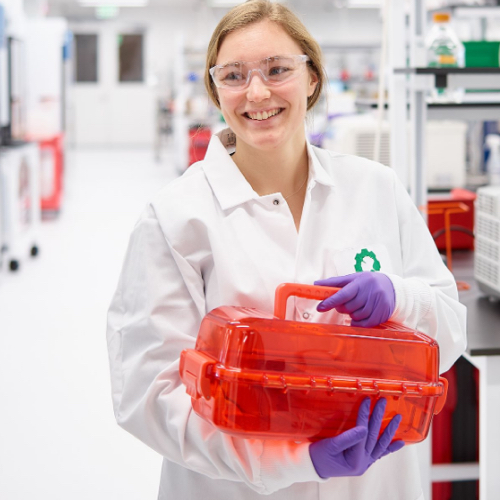We’re thrilled to announce that FGen AG, a subsidiary of Ginkgo based in Switzerland, has been awarded funding through the European Innovation Council’s (EIC) Pathfinder Challenge program!
This is part of an international research consortium that aims to develop a new, sustainable approach to milk protein production using only carbon dioxide and electricity. The consortium, led by Finnish food tech innovator, Solar Foods, and also including leading researchers from the University of Groningen and RWTH Aachen University, was selected from more than 440 proposing teams for their four-year, €5.5M “high-risk/high reward” project playfully named HYDROCOW.
Converting CO2 directly into valuable proteins
The HYDROCOW team will work to genetically engineer hydrogen oxidizing bacteria (HOB) to convert carbon from CO2 gas and nitrogen from N2 into beta-lactoglobulin, a major whey protein found in cow’s milk. Beta-lactoglobulin is used in food applications such as infant formula, protein supplements, and baked goods. Microbial systems that can produce valuable food ingredients and other products directly from CO2 will be critical for sustainable bioproduction of foods, medicines, and chemicals.
Leveraging FGen’s powerful screening technology
Engineered microbes capable of producing beta-lactoglobulin will undergo ultra-high throughput testing at FGen, leveraging its cutting-edge platform that makes it possible to rapidly search through up to 1 million HOB variants in a single run. The highest performing HOB strains identified by FGen will then be validated by Solar Foods under autotrophic growth conditions in an industrially-relevant bioproduction environment.
We built our platform to help innovative companies like Solar Foods enable sustainable nutrition solutions, including alternative dairy.
We’re excited to leverage our powerful screening technology through FGen, and to play a critical role in this space for our commercial and government partners around the world. This project is built around a world-class team of research and development partners, and we’re proud to do our part to bring this promising technology forward.
“The EIC supports the HYDROCOW project in its pursuit to develop sustainable bioproduction methods directly from CO2 and nitrogen compounds,” said EIC Project Officer Olivier Dahon. “EIC is supporting scientific innovation through our portfolio approach for funding research projects under the Pathfinder Challenge: ‘Carbon Dioxide and Nitrogen Management and Valorisation.’ Bringing precision fermentation for sustainable food ingredients from the lab to the market is considered critical for the achievement of the EU Green Deal. Success in this area can provide the technological basis to contribute to a sustainable development of our society,” said EIC Program Manager Francesco Matteucci.
If successful, the HYDROCOW project will enable novel nutrition-focused bioproduction methods that are not reliant on photosynthesis and conventional agriculture, instead converting atmospheric carbon directly into whey proteins, while saving time, energy, and land associated with current practices in the process.
